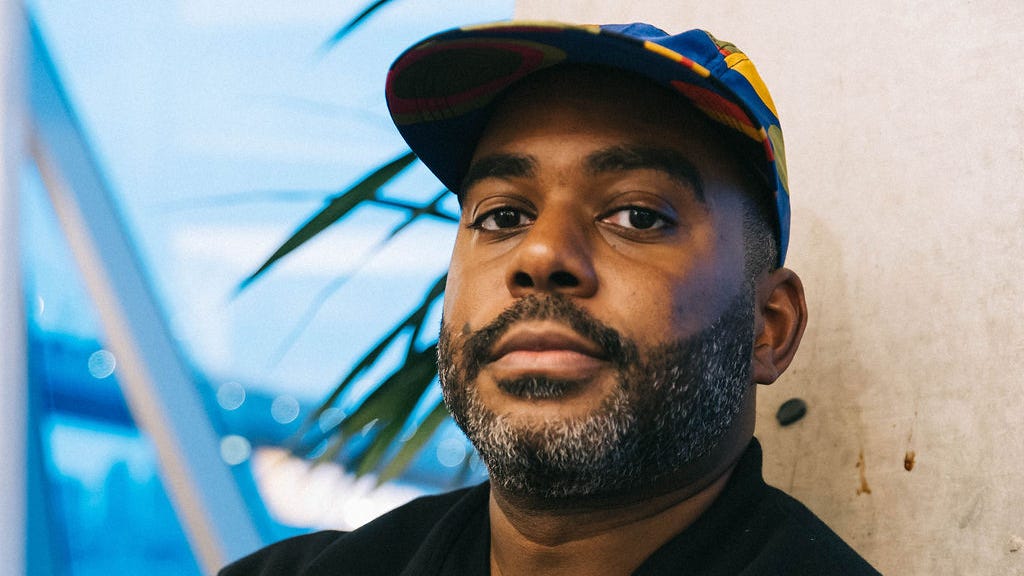I’ve been collaborating with Billboard on a series around ADHD Awareness Month interviewing creative brains in and around music. Here is my extended interview with StockX Chief Impact Officer Damien Hooper-Campbell where he talks about…
A blueprint for requesting ADHD resources at work
Revealing his ADHD during a company all-hands meeting
Telling his future boss about taking Concerta during the interview process
INTERVIEW
How old were you when you first realized you had ADHD?
My elementary school years. I got expelled from two schools between kindergarten and first grade. The administrators would tell my mother, “He's smart, he's in advanced reading and mathematics classes but he's got to stop walking out in the middle of class and getting into fights. We think Damien has ADHD.” In the '80s, there was a negative stigma around any kind of learning disability so my mother, a strong, loving, and protective single Black parent, was afraid and felt like, “Oh no, not my baby.” I had to learn to just push through.
At 26 things came to a head in my life. I was in investment banking working 70 to 90 hours a week and I couldn't understand why I was watching other people zip through stuff. I knew I was smart and had the aptitude, but I was having a challenge. It became desperation.
I went to see Dr. Robert Johnson, dean of the medical school at Rutgers. He’s a Black man who focuses on young adults and adolescents. I didn't go in talking about ADHD per se but in our first session he clearly picked up on it and asked, “Have you ever been tested for ADHD?”
I soon got tested and he said, “You're off the charts for this,” and prescribed me Concerta.
How did it feel knowing you would have to take a pill every day?
There was a bit of a stigma at first, like, do I want people to know that I take a pill every single day? But beyond my insecurity and near-term desire to hide it from the world was hopefulness because I knew that if the diagnosis was correct, and if the medication worked, that it was going to unlock a lot of things for me and make life better.
Also, I thought that this pill was going to solve everything. Like, I take this pill and it would be like the movie Limitless and I’d be good to go, but that's not the case. You still have to put in your own effort, the pill is just an aid, essentially.
What are other tools and techniques you use to manage your ADHD? What makes you feel your most productive and focused?
At 44 years old, sleep is by far number one. Exercise is crazy important to me and diet goes right along with that. Meditation and prayer too. At one point, I was doing a good deal of chanting, it's something that I want to get back into, I found that to be very, very centering.
You also need to think about the energy around you. It's become cliche to say “protect your energy”, but man, it’s true. There are energizers and de-energizers; the older I get, the more intentional I am about the people around me. I've got a big heart and I love helping others, but I also need some people who are pouring into me. A big part of that is learning to say “no” and not always feel like I need to give a detailed reason why. Simply saying, “I'm sorry, I can't but good luck with what you're doing,” is really important.
When did you feel comfortable telling people at work you had ADHD? What prompted you to do it and how did you prepare?
In 2014, I was leaving the finance field in New York and moving to California to work at Google. I was literally trading suits and ties for hoodies. The tech space was so different – the offices had nap rooms, there were free Twizzlers in the cafeteria, people rocked purple hair, you could bring your dog to work, and all the cool things. Talk about sensory overload. I thought to myself, “let me pressure test this and see if they really want me.” I revealed it to the person who would become my manager in the interview process.
After a few rounds of interviews, I said I want to be upfront that I have ADHD. I take medication for it every single day. Here's some of the things it does and here's what that means. I wanted my manager to understand how that lands on the team and how I work best.
I figured, if I’m going to do this – if I’m going to make this change – let's go all the way and be completely transparent. That way I know you want me for who I am.
So in the interview process, you're basically saying, “This is how I work and how I can be an asset to you”?
Sort of, but even to this day, I'm figuring out how I can be an asset with my ADHD. What I knew for sure, was that I was not going to be the most organized individual, and I wasn't a project manager so I needed them to know that.
If it comes to engaging with other human beings, being creative, brainstorming, and even strategy, I'm most certainly your guy. As for the operational execution, that's something I'm gonna have to work a little bit harder at. While finding the right balance is something I'm still figuring out today, I’ve come to learn that more structure is actually good for me.
What do you say to someone who is afraid to tell their employer they have ADHD for fear it could hurt their standing at work?
First, I would validate them and say that's a real feeling. It's easy for me to tell you, “Oh, don't worry about that. Forget it.” That's a bunch of BS.
Second, I would ask that the person do a visualization. Close your eyes and think one year out. You’re in that job and you haven't disclosed your ADHD. You haven't discussed your needs and you’ve been wearing the mask that we all put on so many times as human beings, the mask that we think our employer wants to see. Think about the moment when the real you starts to rear its face in the form of ADHD. Now you're having to compensate, and use your energy not towards the job but to cover your ADHD. Maybe you're underperforming, maybe you're having to overproduce and overcompensate. Now think about the burnout and anxiety that comes with that.
Third, I'd say you've done a bait-and-switch on your employer. You wouldn’t want them showing you a misleading glossy brochure. Oh, look at this wonderful, beautiful place to work, and everybody's so happy and then you get there and find out that it's toxic. You’d be pissed. So why do it to them?
Lastly, I’d say, it's better to know now that you can be the real you rather than find out later that you can't be yourself. And you’d have nobody else to blame except yourself. It's one of those very personal and professional maturity stages that get you to feel confident enough to say “I need to disclose this now because it won't be good for either one of us if I don't.”
Would you recommend people bring up their ADHD in the interview process? What's your advice on how to approach that?
A lot of that depends on where you are in your life, how comfortable you are saying it, and the severity of how you're affected by it. I don't have a one size fits all prescription for folks.
The first thing you should do is research the hell out of whatever organization you're going to work for to see what their company culture is like. Do they have an ERG [Employee Resource Group] or a benefits team that actually focuses on things that one would classify as a disability? Are they the kind of company that actually welcomes people who have those disabilities with open arms?
If you're junior in your career, and depending on your socioeconomic group, you might not have the luxury of getting passed up on a job that your family might be depending on you for. I can't front and act like everybody has the luxury of feeling free to tell their employer. However, the more senior I’ve become, I’ve learned that having that conversation on the front-end has led to better resources. For example, getting an executive assistant was a game changer. You mean, there's somebody who's going to help me make sense of all the ideas in my mind that sometimes isn't super productive? Beautiful!
In addition to an executive assistant, what are some resources, at all levels of the org chart, that are reasonable to ask for? Maybe things people wouldn't think they could have access to.
Again, ask if there's an ERG, or an affinity group at the organization that's focused on inclusion. Companies these days often have employee resource groups for women, LGBTQ+, Black and Latinx communities, and more.
Additionally, ask about benefits. We often talk about benefits in the context of monetary compensation like bonus structures or equity, but ask what kind of insurance platform the company uses. Ask about access to therapy. Are they allowing you a certain number of sessions with a therapist? Is it unlimited? If not, how much will it cost me to keep going? Do they actually give you the ability to choose a therapist of color, specific gender or specialty? Does the insurance cover prescription drugs? Do they have a program where your medication can be delivered to you? I can't tell you the number of times I've totally screwed myself because I waited for my prescription to run out. If I can’t get a session with my therapist right away then I’m stuck without my meds.
Third, if project management and organizational structure is a challenge for you, see what resources they have to help with that. We don't all have to be experts at everything; maybe there are developmental opportunities you can tap into.
I've also heard from people in the All Day Dreaming community that you should think about where you sit. Are you more productive around others or better alone? At 8 a.m. or 8 p.m.? Is there flexibility for when you're available? And asking for things like noise-canceling headphones or paying for your Headspace app. It’s your boss's job to put you in a position to win and these are easy things to help you do that. Also, ADHD is covered under the Disabilities Act so there are legal protections employees have.
Totally. There's some things that you can try to solve for in advance. And then there's some things that you do once you start, which I call “contracting”. If you're a manager, you should be contracting with your team about what works best for you and what works best for them around communication. A few examples:
If you receive an email on the weekend, are you expected to respond immediately?
What's the most efficient way for you to communicate? Email, Slack?
What forms of communication are you uncomfortable with? Text, social DMs?
Even if you're not the manager, it’s important to contract on those things and make sure your team knows what works best for you – obviously, within reason – and vice versa.
What’s your advice to a manager or executive who doesn't know how to best utilize or manage a person with ADHD?
Be clear on your expectations of the outcome, but also give them the space to be creative in how they get there. You want to provide some structure by being really clear about what you expect and what the non-negotiables are. At the same time, you're also giving them the space and freedom to be creative. People with ADHD often take a route many have never considered to get something done.
The other thing that's really important is to have frequent check-ins on how it’s going. As roles and projects evolve, what you contracted on day one may need to change on day 90 or year two.
Finally, give ADHD people latitude for creativity. Celebrate them and leverage their spontaneity when team culture gets a little stale. They can be a great asset.
A large percentage of ADHD people work in creative industries. However, I hit a wall when it came to finding music executives at high levels willing to talk about their ADHD publically. This was especially true of the women I spoke to who know the power of their story but weren't ready to tell it.
You’re one of the few C-suite execs of any industry who is very publicly open about it. What’s your advice for someone at your level who wants to share their story?
I think there's two layers of going public about it. Start with your team. I talk to my teammates about it, I’m okay with it, and I’m very proud of it. I explain to them how seeing a therapist, getting a diagnosis, and taking medication has changed my life. Then normalize it at the company level.
One of the first times I brought it up in a company-wide all-hands meeting, I was traveling around the world to the company's different global locations. I misplaced my luggage and was without my medication for four days. I got up on stage in front of 300 employees and I said, “Look, I'm here with you but if you see me rambling a little bit, just know, it's because I have ADHD.” And told them the story of losing my bags and meds. After that session I had an employee come up to me and say they really appreciated that I shared my story because they had never seen a leader do that publicly. They told me that they also have ADHD and take the same meds.
I’m fortunate at StockX because we have an amazing benefits program that offers therapy and more. We have a CEO who understands the importance – he sits on the board of nonprofits that focus on mental health – so it’s really part of the company culture. While we continue to create new initiatives around inclusion, I’m of the mind that the best way to establish an inclusive culture is to lead by example. As executive leaders, it’s important for us to be real human beings who do not always show up like everything's perfect. It’s important that we are open to talking about it when it's appropriate.
AllDayDreaming.org 🟡 is a member-only community for talented ADHD 🧠 creatives struggling with focus, productivity, and burnout.
CLICK HERE to support this newsletter, podcast and become a member with access to our Discord community which includes ADD Radio streaming 24/7.
CLICK HERE to join the waitlist for member-only daily coworking and cocreating sessions with other ADHD 🧠 creatives plus weekly Q&A’s with experts.
—Hyla
All Day Dreaming 🟡















Share this post